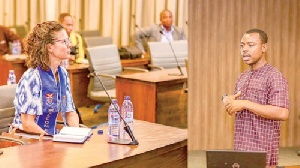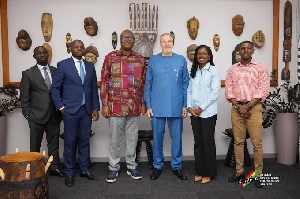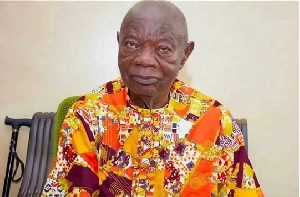- Home - News
- Elections 2024
- News Archive
- Crime & Punishment
- Politics
- Regional
- Editorial
- Health
- Ghanaians Abroad
- Tabloid
- Africa
- Religion
- Photo Archives
- Press Release
General News of Saturday, 24 May 2025
Source: www.ghanawebbers.com
UCC professor proposes mobile lab to combat food fraud
Professor Ernest Teye from the University of Cape Coast (UCC) has proposed a mobile food integrity laboratory. This lab aims to improve food safety detection and reduce food fraud in Ghana and the sub-region.
The mobile lab is compact and bag-sized. It combines a hand-held device with a tested algorithm. This technology assesses food authenticity and quality in real time.
The portable device uses rapid, non-destructive, chemical-free technology. It allows for onsite testing without needing a full laboratory setup.
Professor Teye explained that this innovation is safe, affordable, and versatile. It can be used on various food products.
The mobile lab will help regulators, producers, processors, and exporters verify food integrity along the supply chain.
During a presentation session with British High Commissioner Harriet Thompson, Prof. Teye showcased this innovation. The session was part of her working visit to UCC.
The visit aimed to strengthen collaborations between UCC and UK institutions. These partnerships focus on innovative research addressing societal challenges.
Prof. Teye noted that the mobile lab would address rising food adulteration issues. This is especially important in markets lacking proper laboratory infrastructure.
“The mobile lab will enhance our food monitoring systems,” he said. It will enable swift action in underserved areas.
Recent studies revealed that up to 35 percent of certain foods were adulterated in major markets. These foods included honey, tomato paste, juice, turmeric, oregano, gari, and vegetable oil.
His 2022 research showed over 25 percent of rice, powdered milk, honey, palm oil, and tomato paste samples failed integrity tests in urban markets.
“These are not isolated issues,” he stated. Adulterated items are increasingly found in both local and imported products.
“This mobile lab provides a proactive solution,” he added. He advised the public to consume locally sourced foods with shorter supply chains.
He also encouraged support for the Food and Drugs Authority (FDA) by following safety protocols.
Prof. Teye demonstrated the technology's effectiveness using samples like palm oil and tomatoes.
Ms. Thompson praised UCC for its commitment to impactful research. She reaffirmed the British High Commission’s support for ongoing partnerships with UK research institutions.
She highlighted opportunities from UK-funded research programs that UCC could utilize. “We will continue to support such meaningful partnerships,” she said.











